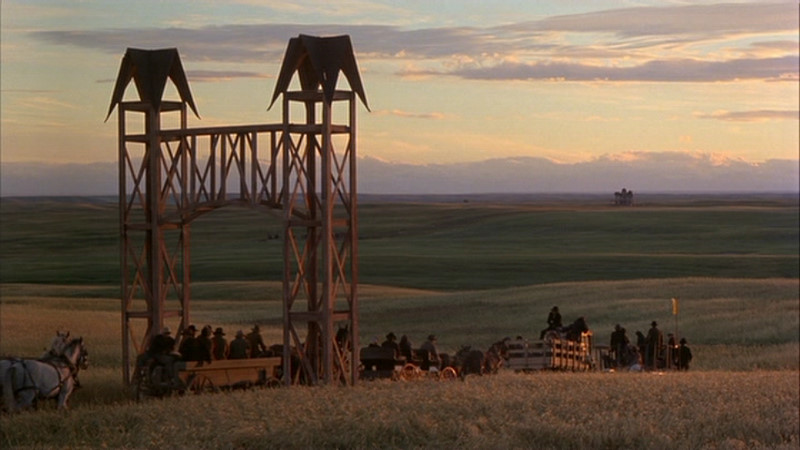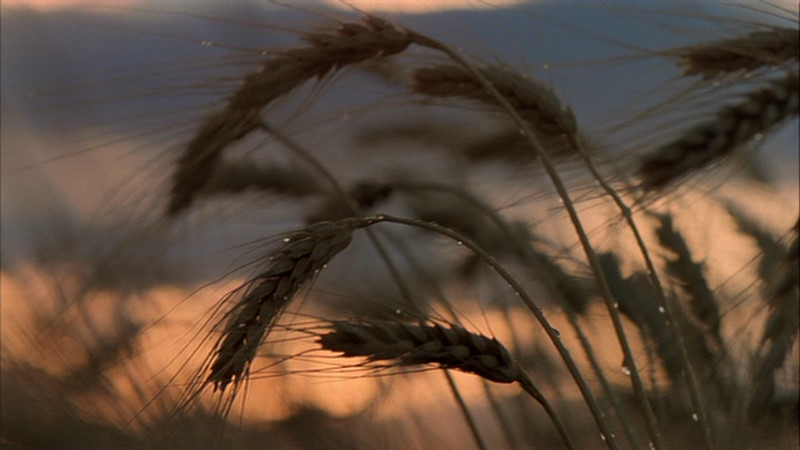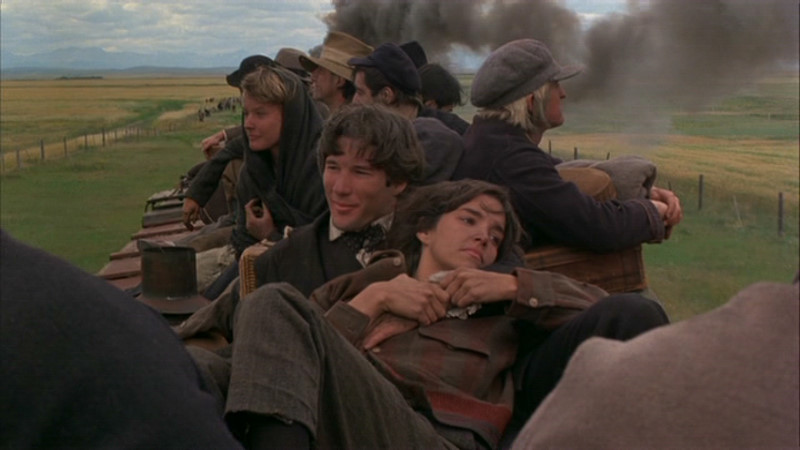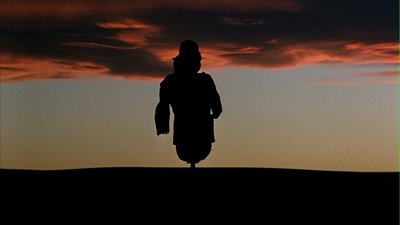My Life in Anamorphic Widescreen: Days of Heaven

For the past week or so I’ve had this quote up from P.T. Anderson’s upcoming film There Will Be Blood as my away message.
“I want to earn enough money I can…get away from everyone.”
That last bit has been running through my head all week. There are many, MANY reasons for that, as it has been a bit of a week and during such times there are moments when you just want to escape from everything in the world.
Plus I was watching and reading about this movie. A lot. Like all of Terrence Malick’s films, Days of Heaven is so rooted in the beauty of nature and how wonderful it can be to be free of the city and feel the open breeze and see the sun for every second it’s over the horizon. But I have to leave the apartment sometime, and once again I’m forced to fight for a spot on the subway before the doors close and have to accept that that smell just will not go away.
And I’m not a man who hates on the city. Generally, I love city life and all of the conveniences that come with it. But I do feel trapped much of the time, and films like Days of Heaven give me hope.

There are days when I believe with every conviction in the world that Terrence Malick is the greatest director who ever lived, and that Days of Heaven is the greatest film ever made. At the very least, his four films mean more to me personally than the complete works of any other director. Not only do they touch me deeply and express the beauty of nature so wonderfully (it’s telling that when I went to see The New World almost two years ago, it was the New Yorkers in the group that hated it), those films have impressed on me much of my love for America.
I think of the small-town life and the open desert in Badlands, the portrait of the migrant worker in the open wheat fields in Days of Heaven, the soldiers wrestling with sacrifice for country in The Thin Red Line, and of course the foundation of the ideal in The New World. I’d held a fascination with the first few years at Jamestown years before The New World, and that film only reaffirmed everything I loved learning about that area, but it was Badlands and especially Days of Heaven that built my love for the Midwest, perhaps the most detested area of the country for most East Coasters. For so many of them, anyone living east of California and west of Virginia has the mind of a child, but I’ve always loved the time I’ve spent in the Midwest. It’s not just the overused “simple folk” bit (although there is something calming to it), but I love looking out the window and not being able to see a trace of civilization.
It’s rare that I feel unqualified to write about a film. It’s not that I’m some well-read scholar of film, because I’m clearly not. But usually I can find a way to express something about a film, particularly the ones I’m in love with. But somehow it’s different with Malick. The New World was, hands down, my favorite film of 2005, and one of my favorites in general, but I never wrote a review of it. How could you? How could you of any of them?
Days of Heaven, like all of Malick’s films, is poetry. There’s almost nothing concrete to critique. Oh, sure, people of tried, arguing that his stories suffer while his imagery is what carries us, but that’s a load. Malick is an extraordinarily underappreciated writer. But what throws people is that the emotions in Days of Heaven (as becomes common for Malick) are not rooted in the present. They’re a memory. There are moments, fleeting moments (and Malick’s a smart enough filmmaker to know that it’s the moments, not the dialogue or even the plot in many cases, that we remember from films) between Bill and Abby that are as sweeping and beautiful and heartbreaking as the wheat in the breeze or wind across the water or those famous locust shots. And those moments are earned because the characters are so beautifully crafted in spite of (and sometimes because of) their limited dialogue. On the commentary track for this Criterion edition, Malick’s collaborators note that he seems to be on his way to someday making a film without dialogue. And while that would indeed be a treat (any Malick film is a treat), it’d be a partial tragedy. The man writes incredible dialogue crafted for the ear, not the eye.

I couldn’t call the film poetry without its visual component though. As lovely as the dialogue is, Linda’s artful telling of the apocalypse…I was going to say it was aided terrifically by the visuals of migrant workers climbing off the train, then I wondered if it was the narration that aided the visuals, but really, one would not be complete without the other. And that’s how well this film works. It’s a totally free form picture, pure impressionism, but the craft, the construction, of it is so exquisite you’d swear it was as specifically constructed as a Stanley Kubrick picture.
This wasn’t the first Terrence Malick film I saw; it was actually the last. I saw it a little over a year ago, in the spring or summer of 2006. I didn’t respond to it as quickly as I did the others. Part of that came from my limited ability to appreciate Richard Gere’s work in the film (I didn’t care much for the guy at the time, and to my own discredit I couldn’t get past that). But over time it just stayed with me. I would continually return mentally and emotionally to those moments, and the intense abandonment Bill experiences. And Linda’s wonderful narration (which…Linda Manz might be one of the most influential writers nobody ever credits – she came up with all of her narration on the spot in the recording studio, based solely off small prompts).
Watching it again was like watching it for the very first time. I’d forgotten enough of it to appreciate its surprises and its stunning, stunning visuals. I was absolutely swept away in its beauty and grace and I cannot put it out of my head – I watch other films (and I watch a LOT of films every week), but still Days of Heaven just keeps coming back to me. And it’s the kind of film you want coming back to you. It’s the kind of film you can let yourself be enveloped in and make it a part of you. In its spare 95-minute running time, this is a film that feels longer; not because it drags, but because it’s so fully-realized, and so lived in, and the kind of place you’re glad to spend a piece of your life in.

VIDEO QUALITY
I nearly wet myself when I thought of Criterion creating a new transfer of a Terrence Malick film (I’m a nerd!). He’s a famously visual director, and Criterion does superb transfers for all their films (even Dazed and Confused, a film never noted for its cinematography, looks like it deserves an Oscar). This is actually the release that prompted me to pony up for the widescreen TV long before I should have. Well, surprise surprise, I wasn’t disappointed. In fact, it’s better than I could’ve dreamed (those screencaps above don't even begin to do it justice). This is my new reference disc whenever the time comes to upgrade to a new TV, or even test out a new DVD player. Or just to show off my system (every film lover has a stack of these). The highest compliment I can pay it is that it just looks so natural.
10 out of 10
AUDIO QUALITY
Unfortunately, as of this moment, we’ve yet to upgrade to a surround-sound system at headquarters, so I’ll refrain from commenting.
SPECIAL FEATURES
I can’t imagine producing special features for a Terrence Malick film. The man makes sure every contract he signs now has a clause that allows him to not talk about the film at all. He makes a film and disappears (for twenty years, in the case of the gap between Days of Heaven and The Thin Red Line). So even though he was involved in the production of this disc, you will not hear or read a word from him. But even without that, Criterion grabbed editor Billy Weber and art director Jack Fisk (both of whom worked on every one of Malick’s films), along with costume designer Patricia Norris and casting director Dianne Crittenden. Weber, Fisk, and Norris were all recorded together, and it’s pretty great to hear them tell stories of Malick’s work style (and ethic!) and how they were able to pull off different effects (I hesitate to use that word, because that makes it sound like CGI, but all of the effects were done right there, on the spot). Weber and Fisk especially have a lot to add, with the experiences of The Thin Red Line and The New World behind them as well.
Beyond that, there are two great interviews with Richard Gere (recorded specifically for this release) and Sam Shepard (from 2002). They both have differing views on Malick’s style with actors, but each contribute really amazing ideas about the film’s narrative and craft.
There’s a section dedicated to the amazing camerawork, featuring interviews with John Bailey, one of the camera operators, and Haskell Wexler, the guy who took over for cinematographer Nestor Almendros when he had to bolt to work with Truffaut in France. This is a much more technical discussion, but I know next to nothing about the workings of a film camera, and I still got a lot out of it.
There’s also a 40-page booklet with an essay from critic Adrian Martin and an excerpt from cinematographer Nestor Almendros’ autobiography (if you thought the Bailey and Wesler were technical…). Both are great, and I always appreciate the inclusion of these booklets in Criterion sets (and I love getting them new – you can smell the ink when you crack them open), but there’s been so much written about Days of Heaven over the past thirty years, I would’ve liked to see more critical analysis.
9.5 out of 10
CONCLUSION
Have I mentioned how much I love this film? For those of you who enjoyed recent films like Into the Wild and The Assassination of Jesse James by the Coward Robert Ford, here’s where they got much of their inspiration (I disagree with comparisons between those films and Malick’s, though, but only because Malick succeeds on this whole other, enormous level that those films are wise not to aim for; still, inspiration is clear). This is filmmaking of the highest degree, and truly one of the finest motion pictures ever crafted.


4 Comments:
wonderful. can't wait to invite myself over and watch it with you.
how much is surround sound going to set you back? you aren't working are you?
i was accosted on all sides once during a poker game on campus when i claimed the thin red line was a better film than saving private ryan. stuck to my guns though.
just wanted to let you know that your reviews got me to watch into the wild and days of heaven. loved em both, amazing movies.
Still unemployed! I'm going to try to angle for surround sound for Christmas. If that doesn't work...I may just need to join the ranks of the employed.
The Thin Red Line is better than Saving Private Ryan. Props on sticking to it.
Oh, and thanks Maggie. That's my only goal with these things, so I'm always glad when it works.
Post a Comment
<< Home